Teaching the Curriculum: Senior Secondary Science
VerifiedAdded on 2023/01/06
|12
|4142
|47
AI Summary
This project focuses on identifying knowledge and skill gaps in a major science teaching subject in senior secondary school, specifically Biology. The gaps are identified in the topics of 'Stem Cell Research' and 'Organ and Tissue transplantation'. The report discusses research undertaken to identify these gaps, analysis of professional knowledge and skills, and proposes a professional learning model to resolve the identified gaps. The goal is to ensure that the teacher has expertise in all the topics of the major science teaching subject.
Contribute Materials
Your contribution can guide someone’s learning journey. Share your
documents today.
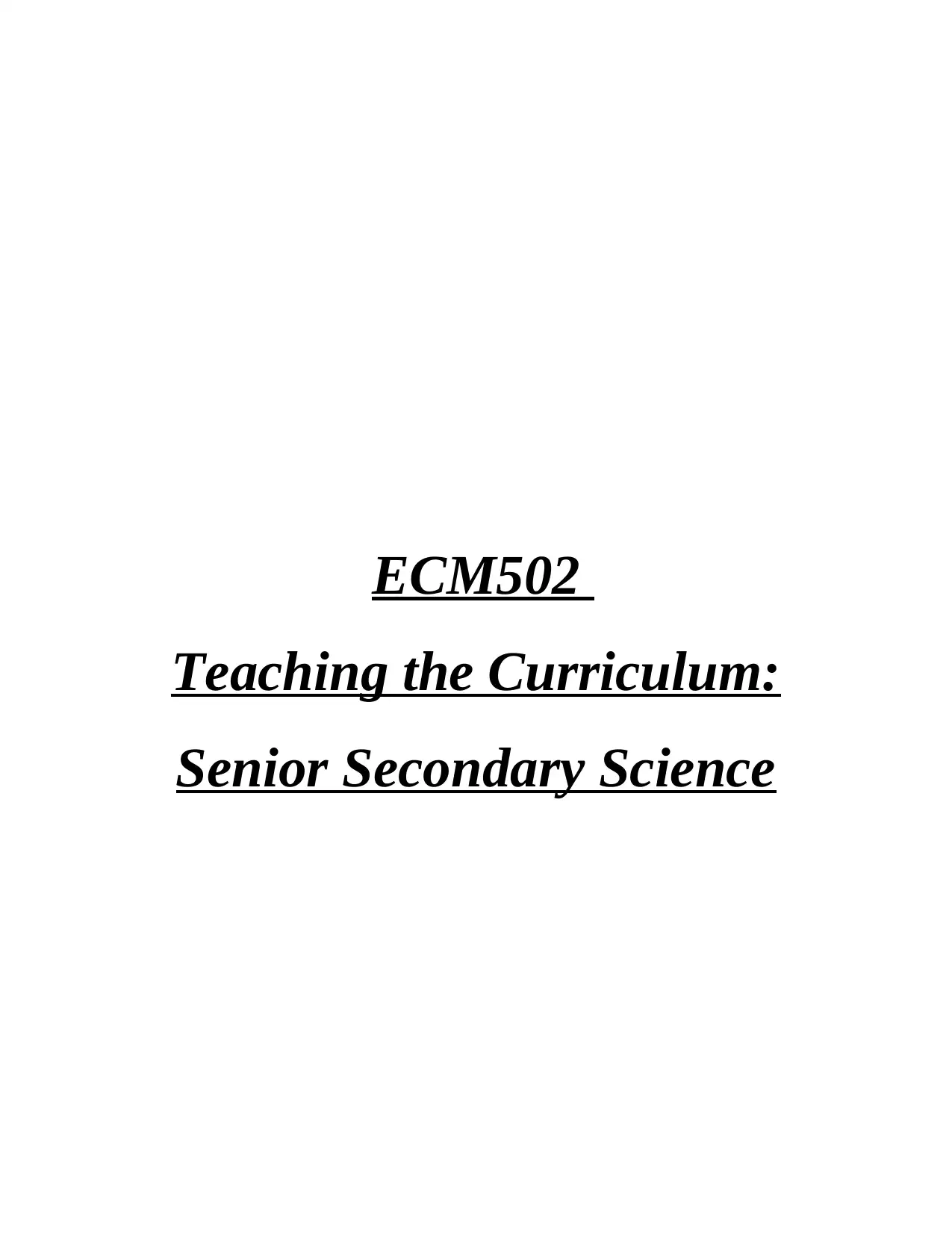
ECM502
Teaching the Curriculum:
Senior Secondary Science
Teaching the Curriculum:
Senior Secondary Science
Secure Best Marks with AI Grader
Need help grading? Try our AI Grader for instant feedback on your assignments.
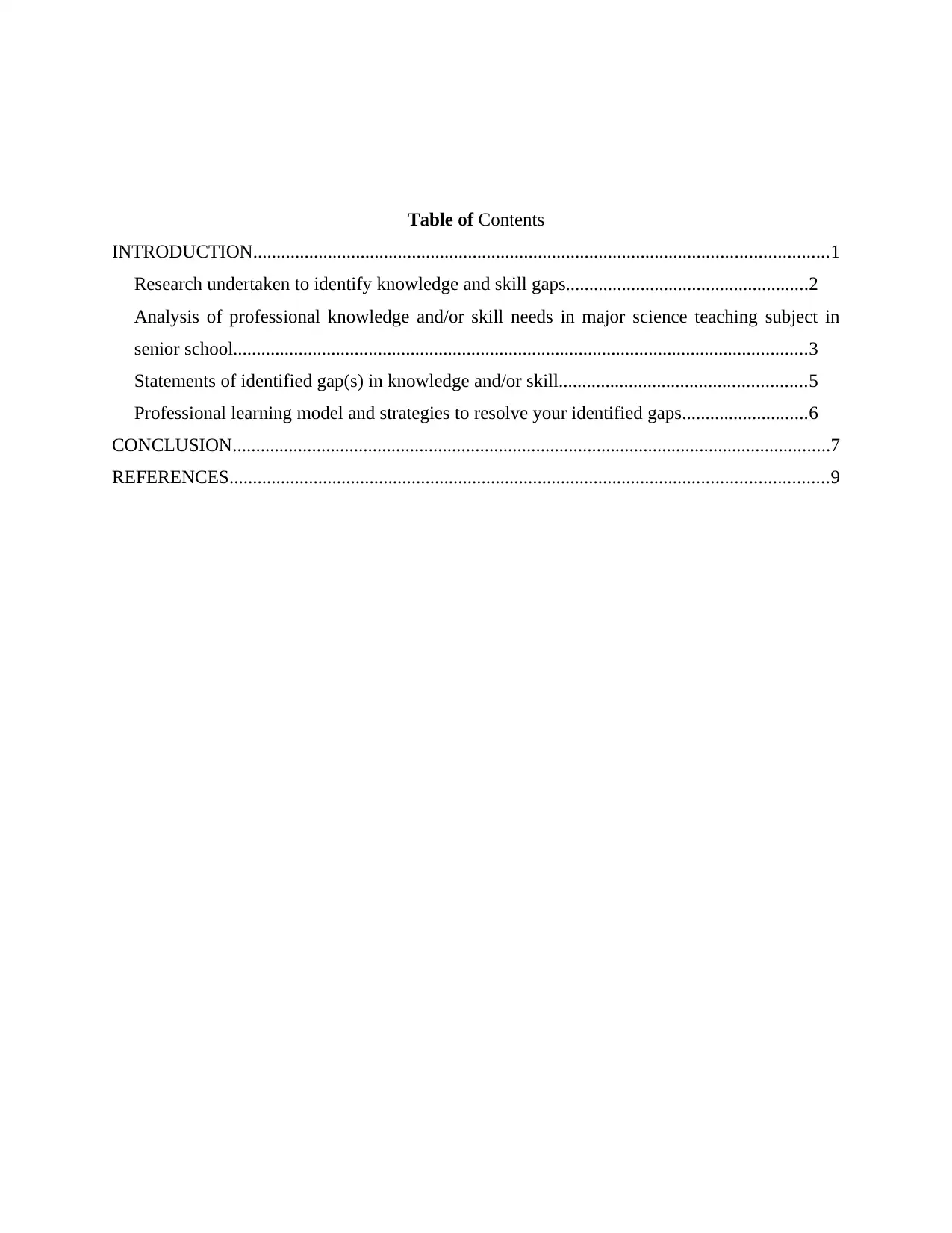
Table of Contents
INTRODUCTION...........................................................................................................................1
Research undertaken to identify knowledge and skill gaps....................................................2
Analysis of professional knowledge and/or skill needs in major science teaching subject in
senior school...........................................................................................................................3
Statements of identified gap(s) in knowledge and/or skill.....................................................5
Professional learning model and strategies to resolve your identified gaps...........................6
CONCLUSION................................................................................................................................7
REFERENCES................................................................................................................................9
INTRODUCTION...........................................................................................................................1
Research undertaken to identify knowledge and skill gaps....................................................2
Analysis of professional knowledge and/or skill needs in major science teaching subject in
senior school...........................................................................................................................3
Statements of identified gap(s) in knowledge and/or skill.....................................................5
Professional learning model and strategies to resolve your identified gaps...........................6
CONCLUSION................................................................................................................................7
REFERENCES................................................................................................................................9
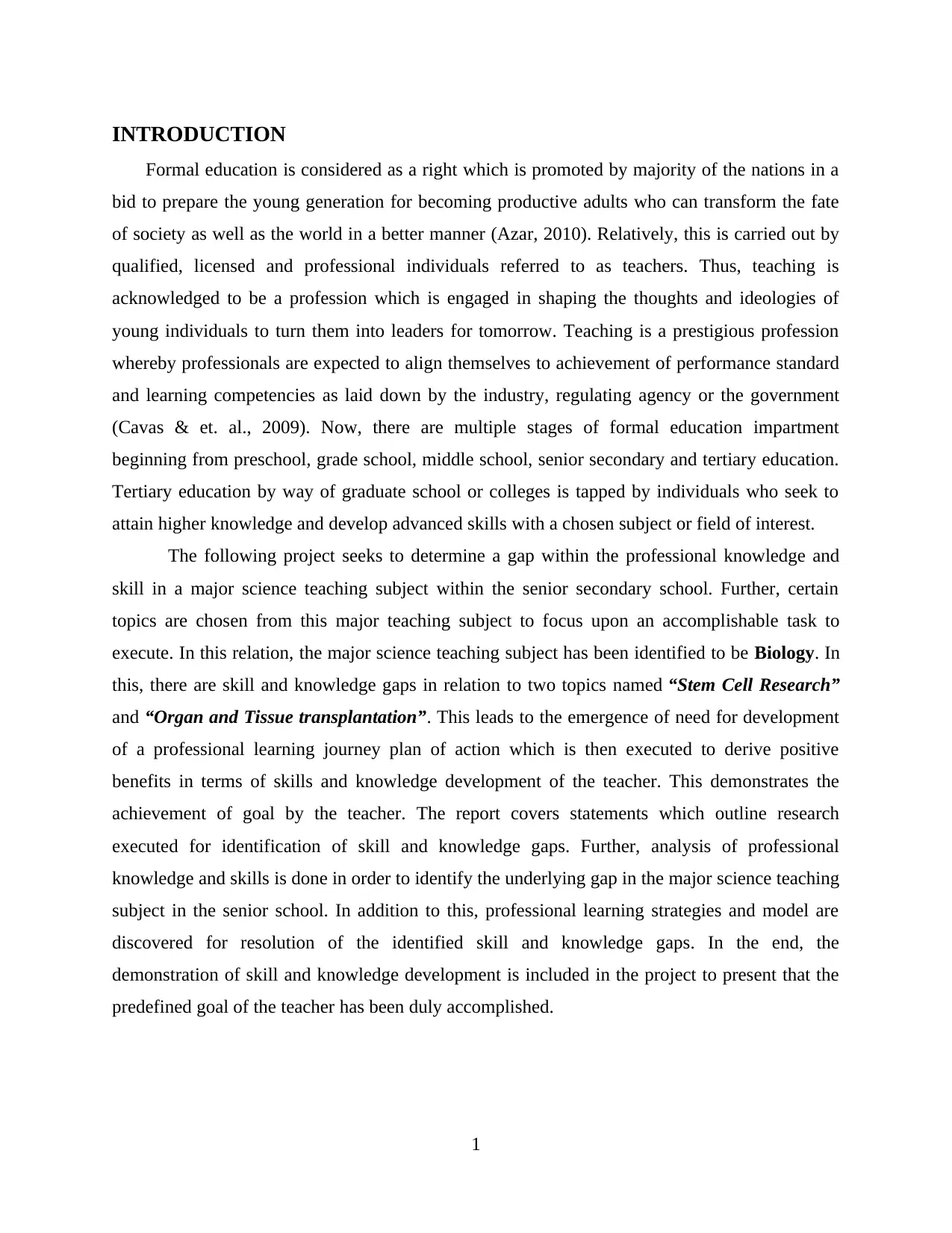
INTRODUCTION
Formal education is considered as a right which is promoted by majority of the nations in a
bid to prepare the young generation for becoming productive adults who can transform the fate
of society as well as the world in a better manner (Azar, 2010). Relatively, this is carried out by
qualified, licensed and professional individuals referred to as teachers. Thus, teaching is
acknowledged to be a profession which is engaged in shaping the thoughts and ideologies of
young individuals to turn them into leaders for tomorrow. Teaching is a prestigious profession
whereby professionals are expected to align themselves to achievement of performance standard
and learning competencies as laid down by the industry, regulating agency or the government
(Cavas & et. al., 2009). Now, there are multiple stages of formal education impartment
beginning from preschool, grade school, middle school, senior secondary and tertiary education.
Tertiary education by way of graduate school or colleges is tapped by individuals who seek to
attain higher knowledge and develop advanced skills with a chosen subject or field of interest.
The following project seeks to determine a gap within the professional knowledge and
skill in a major science teaching subject within the senior secondary school. Further, certain
topics are chosen from this major teaching subject to focus upon an accomplishable task to
execute. In this relation, the major science teaching subject has been identified to be Biology. In
this, there are skill and knowledge gaps in relation to two topics named “Stem Cell Research”
and “Organ and Tissue transplantation”. This leads to the emergence of need for development
of a professional learning journey plan of action which is then executed to derive positive
benefits in terms of skills and knowledge development of the teacher. This demonstrates the
achievement of goal by the teacher. The report covers statements which outline research
executed for identification of skill and knowledge gaps. Further, analysis of professional
knowledge and skills is done in order to identify the underlying gap in the major science teaching
subject in the senior school. In addition to this, professional learning strategies and model are
discovered for resolution of the identified skill and knowledge gaps. In the end, the
demonstration of skill and knowledge development is included in the project to present that the
predefined goal of the teacher has been duly accomplished.
1
Formal education is considered as a right which is promoted by majority of the nations in a
bid to prepare the young generation for becoming productive adults who can transform the fate
of society as well as the world in a better manner (Azar, 2010). Relatively, this is carried out by
qualified, licensed and professional individuals referred to as teachers. Thus, teaching is
acknowledged to be a profession which is engaged in shaping the thoughts and ideologies of
young individuals to turn them into leaders for tomorrow. Teaching is a prestigious profession
whereby professionals are expected to align themselves to achievement of performance standard
and learning competencies as laid down by the industry, regulating agency or the government
(Cavas & et. al., 2009). Now, there are multiple stages of formal education impartment
beginning from preschool, grade school, middle school, senior secondary and tertiary education.
Tertiary education by way of graduate school or colleges is tapped by individuals who seek to
attain higher knowledge and develop advanced skills with a chosen subject or field of interest.
The following project seeks to determine a gap within the professional knowledge and
skill in a major science teaching subject within the senior secondary school. Further, certain
topics are chosen from this major teaching subject to focus upon an accomplishable task to
execute. In this relation, the major science teaching subject has been identified to be Biology. In
this, there are skill and knowledge gaps in relation to two topics named “Stem Cell Research”
and “Organ and Tissue transplantation”. This leads to the emergence of need for development
of a professional learning journey plan of action which is then executed to derive positive
benefits in terms of skills and knowledge development of the teacher. This demonstrates the
achievement of goal by the teacher. The report covers statements which outline research
executed for identification of skill and knowledge gaps. Further, analysis of professional
knowledge and skills is done in order to identify the underlying gap in the major science teaching
subject in the senior school. In addition to this, professional learning strategies and model are
discovered for resolution of the identified skill and knowledge gaps. In the end, the
demonstration of skill and knowledge development is included in the project to present that the
predefined goal of the teacher has been duly accomplished.
1
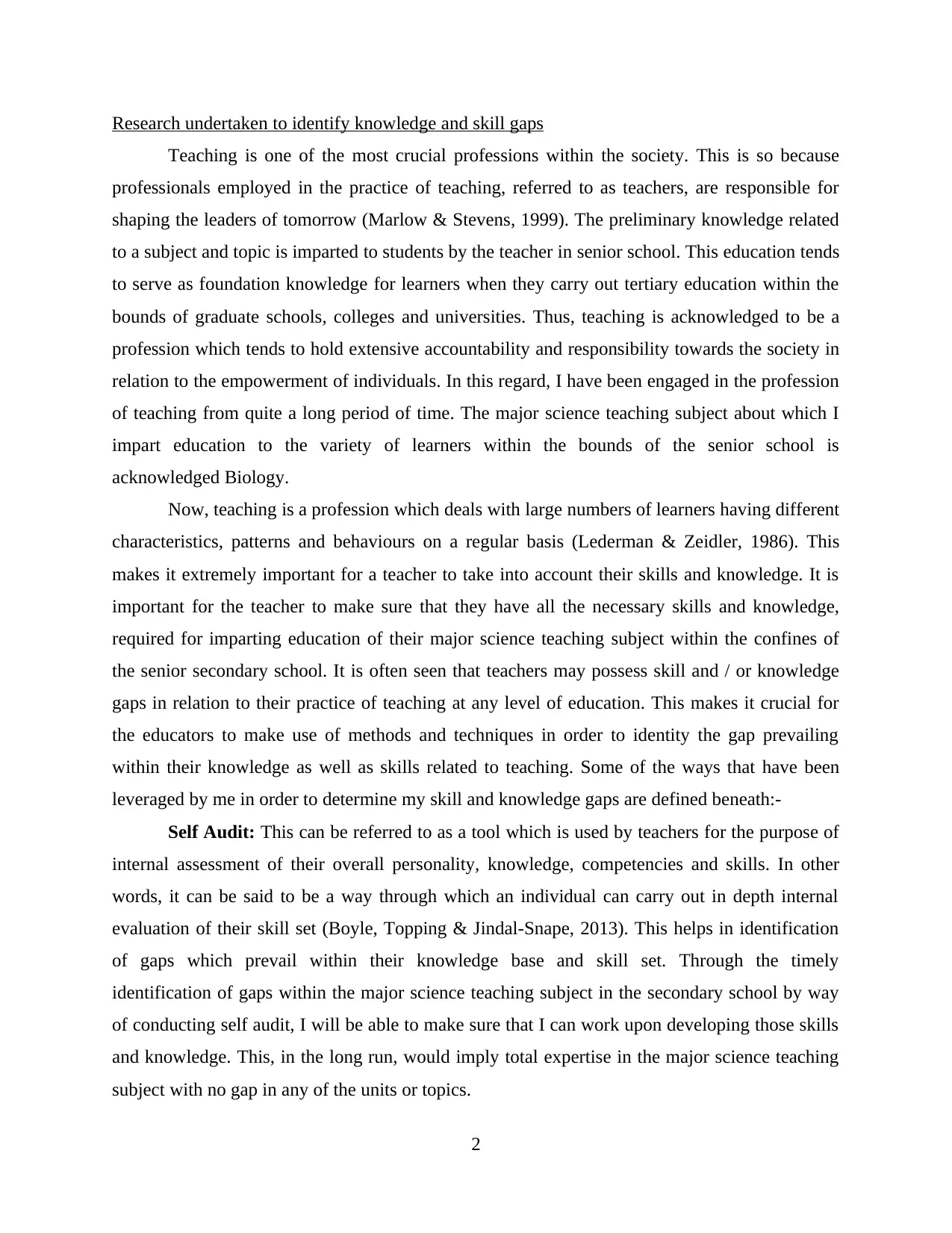
Research undertaken to identify knowledge and skill gaps
Teaching is one of the most crucial professions within the society. This is so because
professionals employed in the practice of teaching, referred to as teachers, are responsible for
shaping the leaders of tomorrow (Marlow & Stevens, 1999). The preliminary knowledge related
to a subject and topic is imparted to students by the teacher in senior school. This education tends
to serve as foundation knowledge for learners when they carry out tertiary education within the
bounds of graduate schools, colleges and universities. Thus, teaching is acknowledged to be a
profession which tends to hold extensive accountability and responsibility towards the society in
relation to the empowerment of individuals. In this regard, I have been engaged in the profession
of teaching from quite a long period of time. The major science teaching subject about which I
impart education to the variety of learners within the bounds of the senior school is
acknowledged Biology.
Now, teaching is a profession which deals with large numbers of learners having different
characteristics, patterns and behaviours on a regular basis (Lederman & Zeidler, 1986). This
makes it extremely important for a teacher to take into account their skills and knowledge. It is
important for the teacher to make sure that they have all the necessary skills and knowledge,
required for imparting education of their major science teaching subject within the confines of
the senior secondary school. It is often seen that teachers may possess skill and / or knowledge
gaps in relation to their practice of teaching at any level of education. This makes it crucial for
the educators to make use of methods and techniques in order to identity the gap prevailing
within their knowledge as well as skills related to teaching. Some of the ways that have been
leveraged by me in order to determine my skill and knowledge gaps are defined beneath:-
Self Audit: This can be referred to as a tool which is used by teachers for the purpose of
internal assessment of their overall personality, knowledge, competencies and skills. In other
words, it can be said to be a way through which an individual can carry out in depth internal
evaluation of their skill set (Boyle, Topping & Jindal-Snape, 2013). This helps in identification
of gaps which prevail within their knowledge base and skill set. Through the timely
identification of gaps within the major science teaching subject in the secondary school by way
of conducting self audit, I will be able to make sure that I can work upon developing those skills
and knowledge. This, in the long run, would imply total expertise in the major science teaching
subject with no gap in any of the units or topics.
2
Teaching is one of the most crucial professions within the society. This is so because
professionals employed in the practice of teaching, referred to as teachers, are responsible for
shaping the leaders of tomorrow (Marlow & Stevens, 1999). The preliminary knowledge related
to a subject and topic is imparted to students by the teacher in senior school. This education tends
to serve as foundation knowledge for learners when they carry out tertiary education within the
bounds of graduate schools, colleges and universities. Thus, teaching is acknowledged to be a
profession which tends to hold extensive accountability and responsibility towards the society in
relation to the empowerment of individuals. In this regard, I have been engaged in the profession
of teaching from quite a long period of time. The major science teaching subject about which I
impart education to the variety of learners within the bounds of the senior school is
acknowledged Biology.
Now, teaching is a profession which deals with large numbers of learners having different
characteristics, patterns and behaviours on a regular basis (Lederman & Zeidler, 1986). This
makes it extremely important for a teacher to take into account their skills and knowledge. It is
important for the teacher to make sure that they have all the necessary skills and knowledge,
required for imparting education of their major science teaching subject within the confines of
the senior secondary school. It is often seen that teachers may possess skill and / or knowledge
gaps in relation to their practice of teaching at any level of education. This makes it crucial for
the educators to make use of methods and techniques in order to identity the gap prevailing
within their knowledge as well as skills related to teaching. Some of the ways that have been
leveraged by me in order to determine my skill and knowledge gaps are defined beneath:-
Self Audit: This can be referred to as a tool which is used by teachers for the purpose of
internal assessment of their overall personality, knowledge, competencies and skills. In other
words, it can be said to be a way through which an individual can carry out in depth internal
evaluation of their skill set (Boyle, Topping & Jindal-Snape, 2013). This helps in identification
of gaps which prevail within their knowledge base and skill set. Through the timely
identification of gaps within the major science teaching subject in the secondary school by way
of conducting self audit, I will be able to make sure that I can work upon developing those skills
and knowledge. This, in the long run, would imply total expertise in the major science teaching
subject with no gap in any of the units or topics.
2
Secure Best Marks with AI Grader
Need help grading? Try our AI Grader for instant feedback on your assignments.
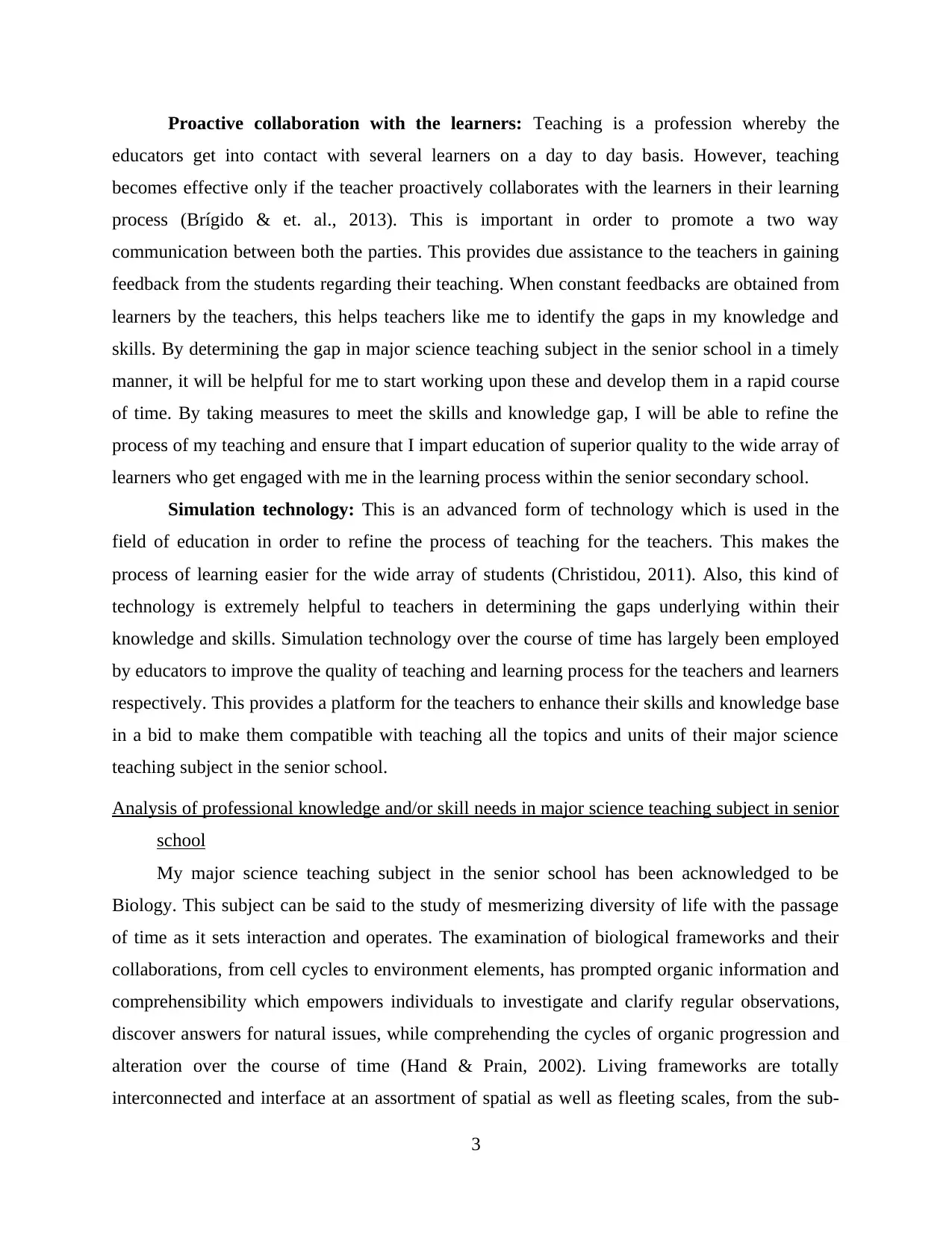
Proactive collaboration with the learners: Teaching is a profession whereby the
educators get into contact with several learners on a day to day basis. However, teaching
becomes effective only if the teacher proactively collaborates with the learners in their learning
process (Brígido & et. al., 2013). This is important in order to promote a two way
communication between both the parties. This provides due assistance to the teachers in gaining
feedback from the students regarding their teaching. When constant feedbacks are obtained from
learners by the teachers, this helps teachers like me to identify the gaps in my knowledge and
skills. By determining the gap in major science teaching subject in the senior school in a timely
manner, it will be helpful for me to start working upon these and develop them in a rapid course
of time. By taking measures to meet the skills and knowledge gap, I will be able to refine the
process of my teaching and ensure that I impart education of superior quality to the wide array of
learners who get engaged with me in the learning process within the senior secondary school.
Simulation technology: This is an advanced form of technology which is used in the
field of education in order to refine the process of teaching for the teachers. This makes the
process of learning easier for the wide array of students (Christidou, 2011). Also, this kind of
technology is extremely helpful to teachers in determining the gaps underlying within their
knowledge and skills. Simulation technology over the course of time has largely been employed
by educators to improve the quality of teaching and learning process for the teachers and learners
respectively. This provides a platform for the teachers to enhance their skills and knowledge base
in a bid to make them compatible with teaching all the topics and units of their major science
teaching subject in the senior school.
Analysis of professional knowledge and/or skill needs in major science teaching subject in senior
school
My major science teaching subject in the senior school has been acknowledged to be
Biology. This subject can be said to the study of mesmerizing diversity of life with the passage
of time as it sets interaction and operates. The examination of biological frameworks and their
collaborations, from cell cycles to environment elements, has prompted organic information and
comprehensibility which empowers individuals to investigate and clarify regular observations,
discover answers for natural issues, while comprehending the cycles of organic progression and
alteration over the course of time (Hand & Prain, 2002). Living frameworks are totally
interconnected and interface at an assortment of spatial as well as fleeting scales, from the sub-
3
educators get into contact with several learners on a day to day basis. However, teaching
becomes effective only if the teacher proactively collaborates with the learners in their learning
process (Brígido & et. al., 2013). This is important in order to promote a two way
communication between both the parties. This provides due assistance to the teachers in gaining
feedback from the students regarding their teaching. When constant feedbacks are obtained from
learners by the teachers, this helps teachers like me to identify the gaps in my knowledge and
skills. By determining the gap in major science teaching subject in the senior school in a timely
manner, it will be helpful for me to start working upon these and develop them in a rapid course
of time. By taking measures to meet the skills and knowledge gap, I will be able to refine the
process of my teaching and ensure that I impart education of superior quality to the wide array of
learners who get engaged with me in the learning process within the senior secondary school.
Simulation technology: This is an advanced form of technology which is used in the
field of education in order to refine the process of teaching for the teachers. This makes the
process of learning easier for the wide array of students (Christidou, 2011). Also, this kind of
technology is extremely helpful to teachers in determining the gaps underlying within their
knowledge and skills. Simulation technology over the course of time has largely been employed
by educators to improve the quality of teaching and learning process for the teachers and learners
respectively. This provides a platform for the teachers to enhance their skills and knowledge base
in a bid to make them compatible with teaching all the topics and units of their major science
teaching subject in the senior school.
Analysis of professional knowledge and/or skill needs in major science teaching subject in senior
school
My major science teaching subject in the senior school has been acknowledged to be
Biology. This subject can be said to the study of mesmerizing diversity of life with the passage
of time as it sets interaction and operates. The examination of biological frameworks and their
collaborations, from cell cycles to environment elements, has prompted organic information and
comprehensibility which empowers individuals to investigate and clarify regular observations,
discover answers for natural issues, while comprehending the cycles of organic progression and
alteration over the course of time (Hand & Prain, 2002). Living frameworks are totally
interconnected and interface at an assortment of spatial as well as fleeting scales, from the sub-
3
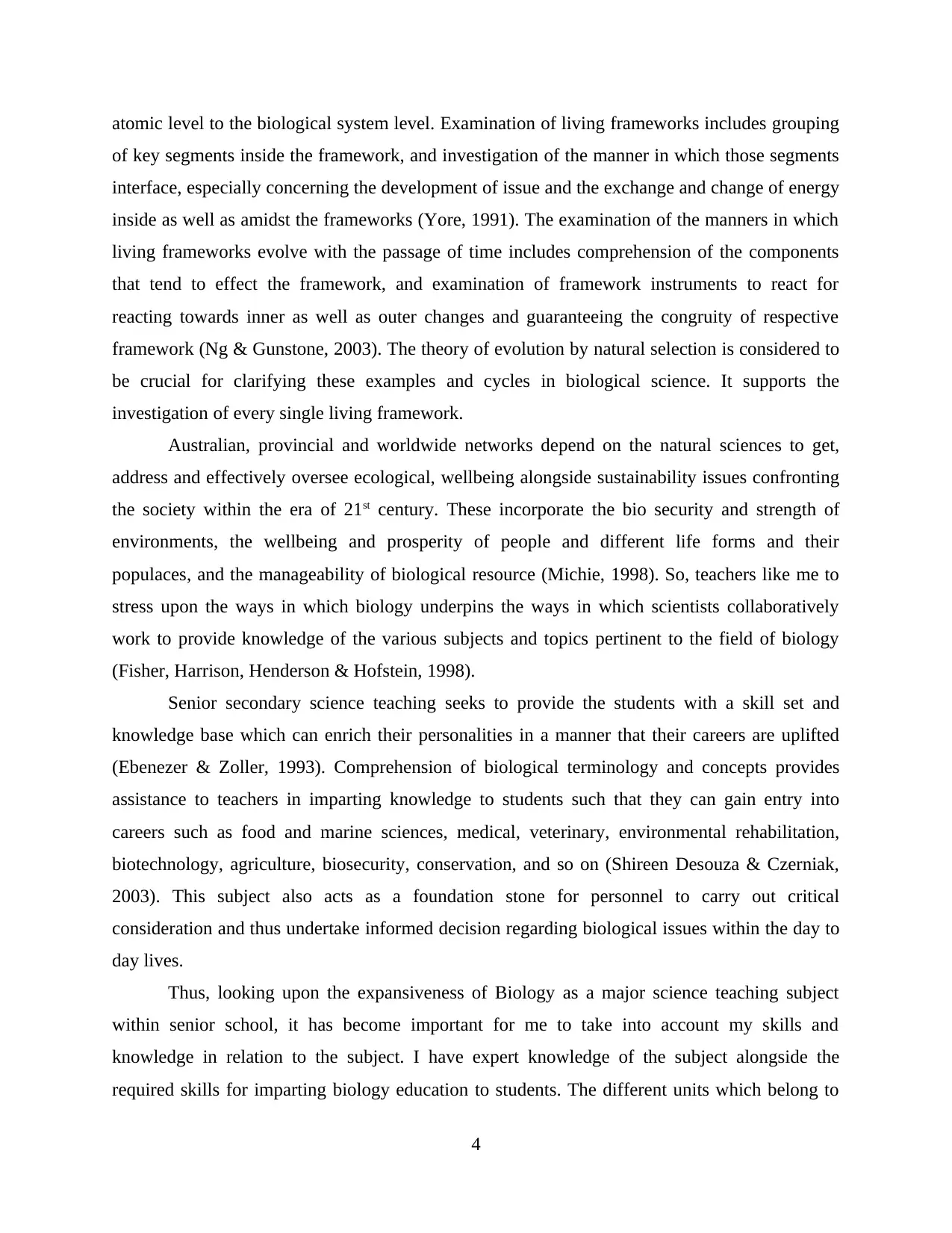
atomic level to the biological system level. Examination of living frameworks includes grouping
of key segments inside the framework, and investigation of the manner in which those segments
interface, especially concerning the development of issue and the exchange and change of energy
inside as well as amidst the frameworks (Yore, 1991). The examination of the manners in which
living frameworks evolve with the passage of time includes comprehension of the components
that tend to effect the framework, and examination of framework instruments to react for
reacting towards inner as well as outer changes and guaranteeing the congruity of respective
framework (Ng & Gunstone, 2003). The theory of evolution by natural selection is considered to
be crucial for clarifying these examples and cycles in biological science. It supports the
investigation of every single living framework.
Australian, provincial and worldwide networks depend on the natural sciences to get,
address and effectively oversee ecological, wellbeing alongside sustainability issues confronting
the society within the era of 21st century. These incorporate the bio security and strength of
environments, the wellbeing and prosperity of people and different life forms and their
populaces, and the manageability of biological resource (Michie, 1998). So, teachers like me to
stress upon the ways in which biology underpins the ways in which scientists collaboratively
work to provide knowledge of the various subjects and topics pertinent to the field of biology
(Fisher, Harrison, Henderson & Hofstein, 1998).
Senior secondary science teaching seeks to provide the students with a skill set and
knowledge base which can enrich their personalities in a manner that their careers are uplifted
(Ebenezer & Zoller, 1993). Comprehension of biological terminology and concepts provides
assistance to teachers in imparting knowledge to students such that they can gain entry into
careers such as food and marine sciences, medical, veterinary, environmental rehabilitation,
biotechnology, agriculture, biosecurity, conservation, and so on (Shireen Desouza & Czerniak,
2003). This subject also acts as a foundation stone for personnel to carry out critical
consideration and thus undertake informed decision regarding biological issues within the day to
day lives.
Thus, looking upon the expansiveness of Biology as a major science teaching subject
within senior school, it has become important for me to take into account my skills and
knowledge in relation to the subject. I have expert knowledge of the subject alongside the
required skills for imparting biology education to students. The different units which belong to
4
of key segments inside the framework, and investigation of the manner in which those segments
interface, especially concerning the development of issue and the exchange and change of energy
inside as well as amidst the frameworks (Yore, 1991). The examination of the manners in which
living frameworks evolve with the passage of time includes comprehension of the components
that tend to effect the framework, and examination of framework instruments to react for
reacting towards inner as well as outer changes and guaranteeing the congruity of respective
framework (Ng & Gunstone, 2003). The theory of evolution by natural selection is considered to
be crucial for clarifying these examples and cycles in biological science. It supports the
investigation of every single living framework.
Australian, provincial and worldwide networks depend on the natural sciences to get,
address and effectively oversee ecological, wellbeing alongside sustainability issues confronting
the society within the era of 21st century. These incorporate the bio security and strength of
environments, the wellbeing and prosperity of people and different life forms and their
populaces, and the manageability of biological resource (Michie, 1998). So, teachers like me to
stress upon the ways in which biology underpins the ways in which scientists collaboratively
work to provide knowledge of the various subjects and topics pertinent to the field of biology
(Fisher, Harrison, Henderson & Hofstein, 1998).
Senior secondary science teaching seeks to provide the students with a skill set and
knowledge base which can enrich their personalities in a manner that their careers are uplifted
(Ebenezer & Zoller, 1993). Comprehension of biological terminology and concepts provides
assistance to teachers in imparting knowledge to students such that they can gain entry into
careers such as food and marine sciences, medical, veterinary, environmental rehabilitation,
biotechnology, agriculture, biosecurity, conservation, and so on (Shireen Desouza & Czerniak,
2003). This subject also acts as a foundation stone for personnel to carry out critical
consideration and thus undertake informed decision regarding biological issues within the day to
day lives.
Thus, looking upon the expansiveness of Biology as a major science teaching subject
within senior school, it has become important for me to take into account my skills and
knowledge in relation to the subject. I have expert knowledge of the subject alongside the
required skills for imparting biology education to students. The different units which belong to
4
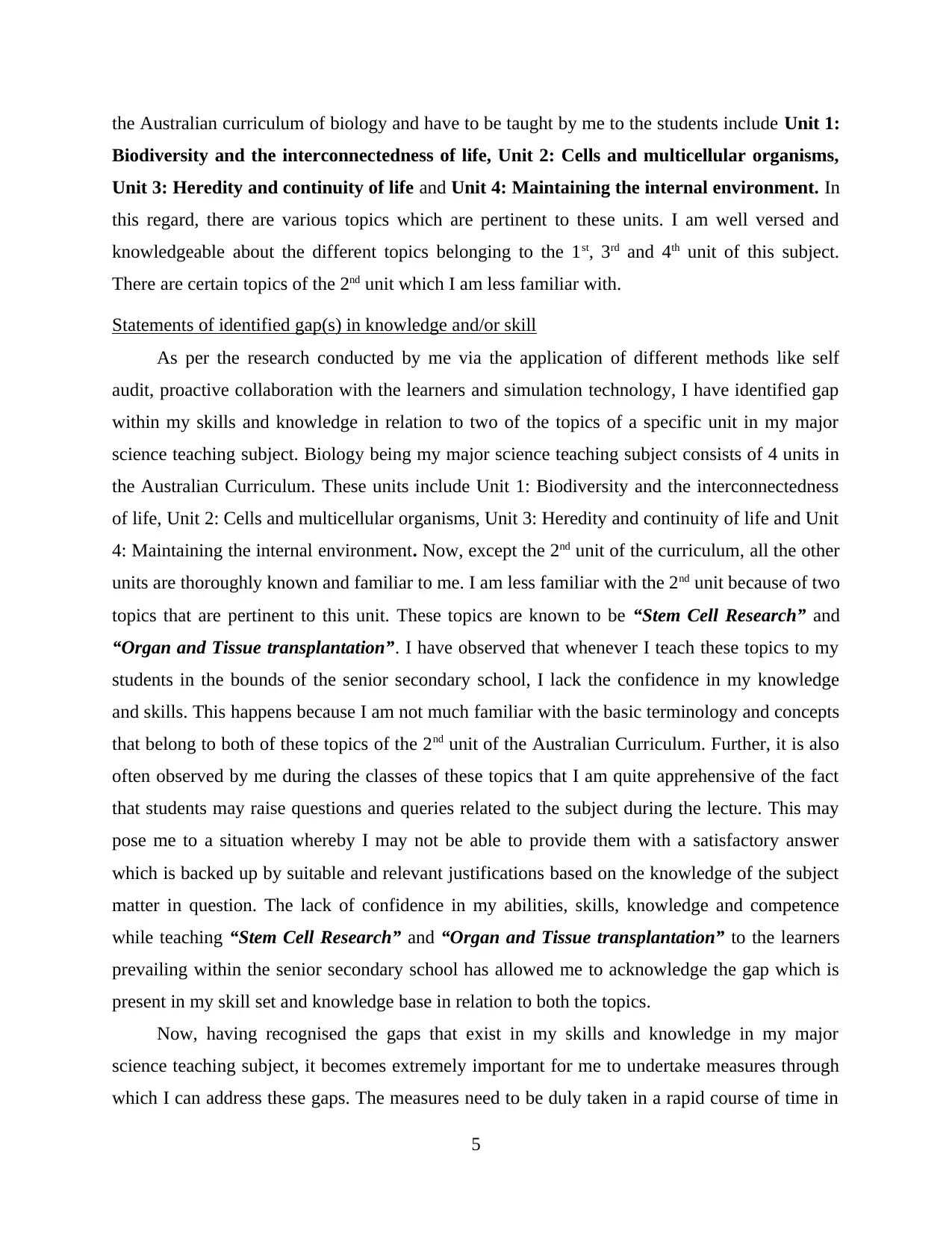
the Australian curriculum of biology and have to be taught by me to the students include Unit 1:
Biodiversity and the interconnectedness of life, Unit 2: Cells and multicellular organisms,
Unit 3: Heredity and continuity of life and Unit 4: Maintaining the internal environment. In
this regard, there are various topics which are pertinent to these units. I am well versed and
knowledgeable about the different topics belonging to the 1st, 3rd and 4th unit of this subject.
There are certain topics of the 2nd unit which I am less familiar with.
Statements of identified gap(s) in knowledge and/or skill
As per the research conducted by me via the application of different methods like self
audit, proactive collaboration with the learners and simulation technology, I have identified gap
within my skills and knowledge in relation to two of the topics of a specific unit in my major
science teaching subject. Biology being my major science teaching subject consists of 4 units in
the Australian Curriculum. These units include Unit 1: Biodiversity and the interconnectedness
of life, Unit 2: Cells and multicellular organisms, Unit 3: Heredity and continuity of life and Unit
4: Maintaining the internal environment. Now, except the 2nd unit of the curriculum, all the other
units are thoroughly known and familiar to me. I am less familiar with the 2nd unit because of two
topics that are pertinent to this unit. These topics are known to be “Stem Cell Research” and
“Organ and Tissue transplantation”. I have observed that whenever I teach these topics to my
students in the bounds of the senior secondary school, I lack the confidence in my knowledge
and skills. This happens because I am not much familiar with the basic terminology and concepts
that belong to both of these topics of the 2nd unit of the Australian Curriculum. Further, it is also
often observed by me during the classes of these topics that I am quite apprehensive of the fact
that students may raise questions and queries related to the subject during the lecture. This may
pose me to a situation whereby I may not be able to provide them with a satisfactory answer
which is backed up by suitable and relevant justifications based on the knowledge of the subject
matter in question. The lack of confidence in my abilities, skills, knowledge and competence
while teaching “Stem Cell Research” and “Organ and Tissue transplantation” to the learners
prevailing within the senior secondary school has allowed me to acknowledge the gap which is
present in my skill set and knowledge base in relation to both the topics.
Now, having recognised the gaps that exist in my skills and knowledge in my major
science teaching subject, it becomes extremely important for me to undertake measures through
which I can address these gaps. The measures need to be duly taken in a rapid course of time in
5
Biodiversity and the interconnectedness of life, Unit 2: Cells and multicellular organisms,
Unit 3: Heredity and continuity of life and Unit 4: Maintaining the internal environment. In
this regard, there are various topics which are pertinent to these units. I am well versed and
knowledgeable about the different topics belonging to the 1st, 3rd and 4th unit of this subject.
There are certain topics of the 2nd unit which I am less familiar with.
Statements of identified gap(s) in knowledge and/or skill
As per the research conducted by me via the application of different methods like self
audit, proactive collaboration with the learners and simulation technology, I have identified gap
within my skills and knowledge in relation to two of the topics of a specific unit in my major
science teaching subject. Biology being my major science teaching subject consists of 4 units in
the Australian Curriculum. These units include Unit 1: Biodiversity and the interconnectedness
of life, Unit 2: Cells and multicellular organisms, Unit 3: Heredity and continuity of life and Unit
4: Maintaining the internal environment. Now, except the 2nd unit of the curriculum, all the other
units are thoroughly known and familiar to me. I am less familiar with the 2nd unit because of two
topics that are pertinent to this unit. These topics are known to be “Stem Cell Research” and
“Organ and Tissue transplantation”. I have observed that whenever I teach these topics to my
students in the bounds of the senior secondary school, I lack the confidence in my knowledge
and skills. This happens because I am not much familiar with the basic terminology and concepts
that belong to both of these topics of the 2nd unit of the Australian Curriculum. Further, it is also
often observed by me during the classes of these topics that I am quite apprehensive of the fact
that students may raise questions and queries related to the subject during the lecture. This may
pose me to a situation whereby I may not be able to provide them with a satisfactory answer
which is backed up by suitable and relevant justifications based on the knowledge of the subject
matter in question. The lack of confidence in my abilities, skills, knowledge and competence
while teaching “Stem Cell Research” and “Organ and Tissue transplantation” to the learners
prevailing within the senior secondary school has allowed me to acknowledge the gap which is
present in my skill set and knowledge base in relation to both the topics.
Now, having recognised the gaps that exist in my skills and knowledge in my major
science teaching subject, it becomes extremely important for me to undertake measures through
which I can address these gaps. The measures need to be duly taken in a rapid course of time in
5
Paraphrase This Document
Need a fresh take? Get an instant paraphrase of this document with our AI Paraphraser
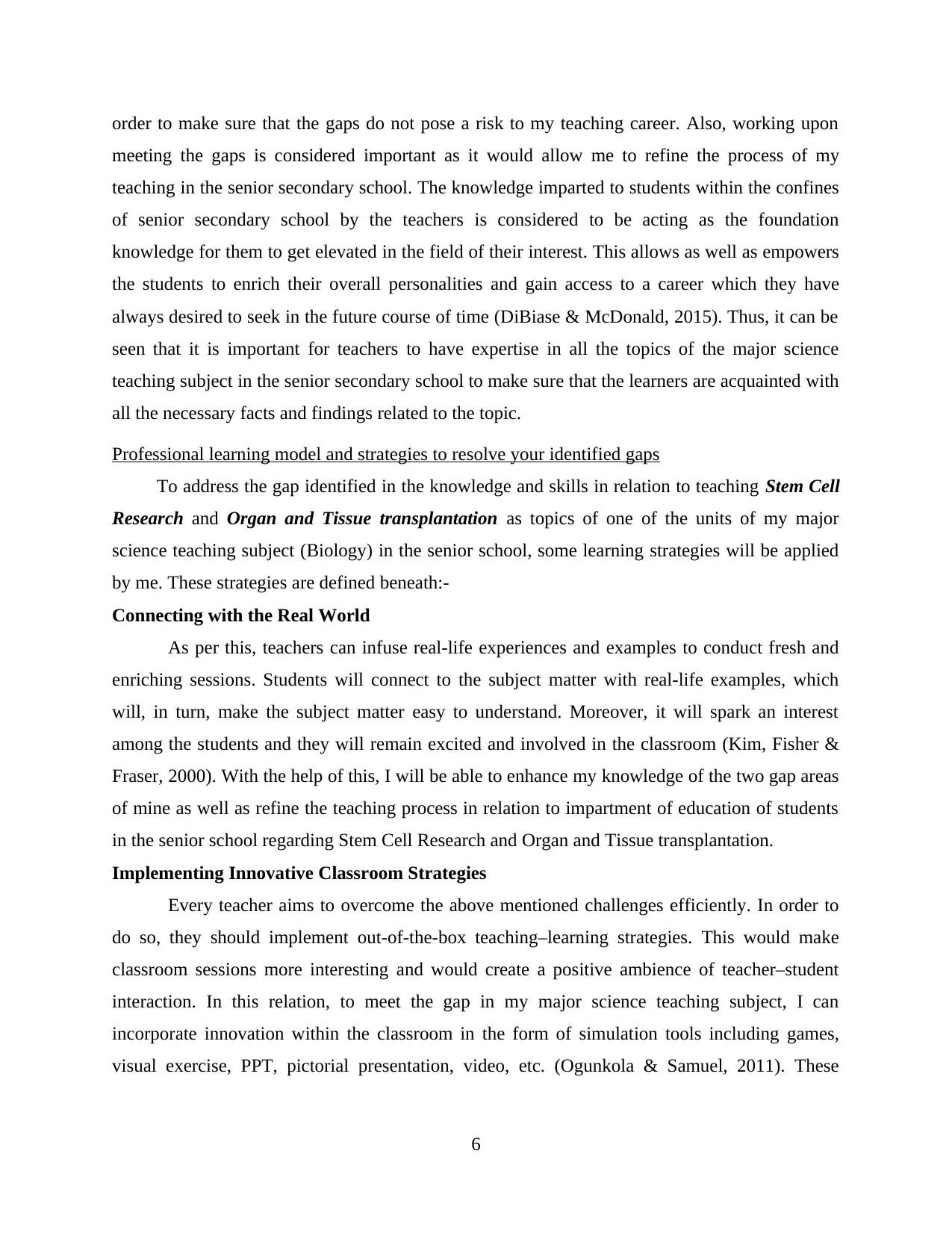
order to make sure that the gaps do not pose a risk to my teaching career. Also, working upon
meeting the gaps is considered important as it would allow me to refine the process of my
teaching in the senior secondary school. The knowledge imparted to students within the confines
of senior secondary school by the teachers is considered to be acting as the foundation
knowledge for them to get elevated in the field of their interest. This allows as well as empowers
the students to enrich their overall personalities and gain access to a career which they have
always desired to seek in the future course of time (DiBiase & McDonald, 2015). Thus, it can be
seen that it is important for teachers to have expertise in all the topics of the major science
teaching subject in the senior secondary school to make sure that the learners are acquainted with
all the necessary facts and findings related to the topic.
Professional learning model and strategies to resolve your identified gaps
To address the gap identified in the knowledge and skills in relation to teaching Stem Cell
Research and Organ and Tissue transplantation as topics of one of the units of my major
science teaching subject (Biology) in the senior school, some learning strategies will be applied
by me. These strategies are defined beneath:-
Connecting with the Real World
As per this, teachers can infuse real-life experiences and examples to conduct fresh and
enriching sessions. Students will connect to the subject matter with real-life examples, which
will, in turn, make the subject matter easy to understand. Moreover, it will spark an interest
among the students and they will remain excited and involved in the classroom (Kim, Fisher &
Fraser, 2000). With the help of this, I will be able to enhance my knowledge of the two gap areas
of mine as well as refine the teaching process in relation to impartment of education of students
in the senior school regarding Stem Cell Research and Organ and Tissue transplantation.
Implementing Innovative Classroom Strategies
Every teacher aims to overcome the above mentioned challenges efficiently. In order to
do so, they should implement out-of-the-box teaching–learning strategies. This would make
classroom sessions more interesting and would create a positive ambience of teacher–student
interaction. In this relation, to meet the gap in my major science teaching subject, I can
incorporate innovation within the classroom in the form of simulation tools including games,
visual exercise, PPT, pictorial presentation, video, etc. (Ogunkola & Samuel, 2011). These
6
meeting the gaps is considered important as it would allow me to refine the process of my
teaching in the senior secondary school. The knowledge imparted to students within the confines
of senior secondary school by the teachers is considered to be acting as the foundation
knowledge for them to get elevated in the field of their interest. This allows as well as empowers
the students to enrich their overall personalities and gain access to a career which they have
always desired to seek in the future course of time (DiBiase & McDonald, 2015). Thus, it can be
seen that it is important for teachers to have expertise in all the topics of the major science
teaching subject in the senior secondary school to make sure that the learners are acquainted with
all the necessary facts and findings related to the topic.
Professional learning model and strategies to resolve your identified gaps
To address the gap identified in the knowledge and skills in relation to teaching Stem Cell
Research and Organ and Tissue transplantation as topics of one of the units of my major
science teaching subject (Biology) in the senior school, some learning strategies will be applied
by me. These strategies are defined beneath:-
Connecting with the Real World
As per this, teachers can infuse real-life experiences and examples to conduct fresh and
enriching sessions. Students will connect to the subject matter with real-life examples, which
will, in turn, make the subject matter easy to understand. Moreover, it will spark an interest
among the students and they will remain excited and involved in the classroom (Kim, Fisher &
Fraser, 2000). With the help of this, I will be able to enhance my knowledge of the two gap areas
of mine as well as refine the teaching process in relation to impartment of education of students
in the senior school regarding Stem Cell Research and Organ and Tissue transplantation.
Implementing Innovative Classroom Strategies
Every teacher aims to overcome the above mentioned challenges efficiently. In order to
do so, they should implement out-of-the-box teaching–learning strategies. This would make
classroom sessions more interesting and would create a positive ambience of teacher–student
interaction. In this relation, to meet the gap in my major science teaching subject, I can
incorporate innovation within the classroom in the form of simulation tools including games,
visual exercise, PPT, pictorial presentation, video, etc. (Ogunkola & Samuel, 2011). These
6
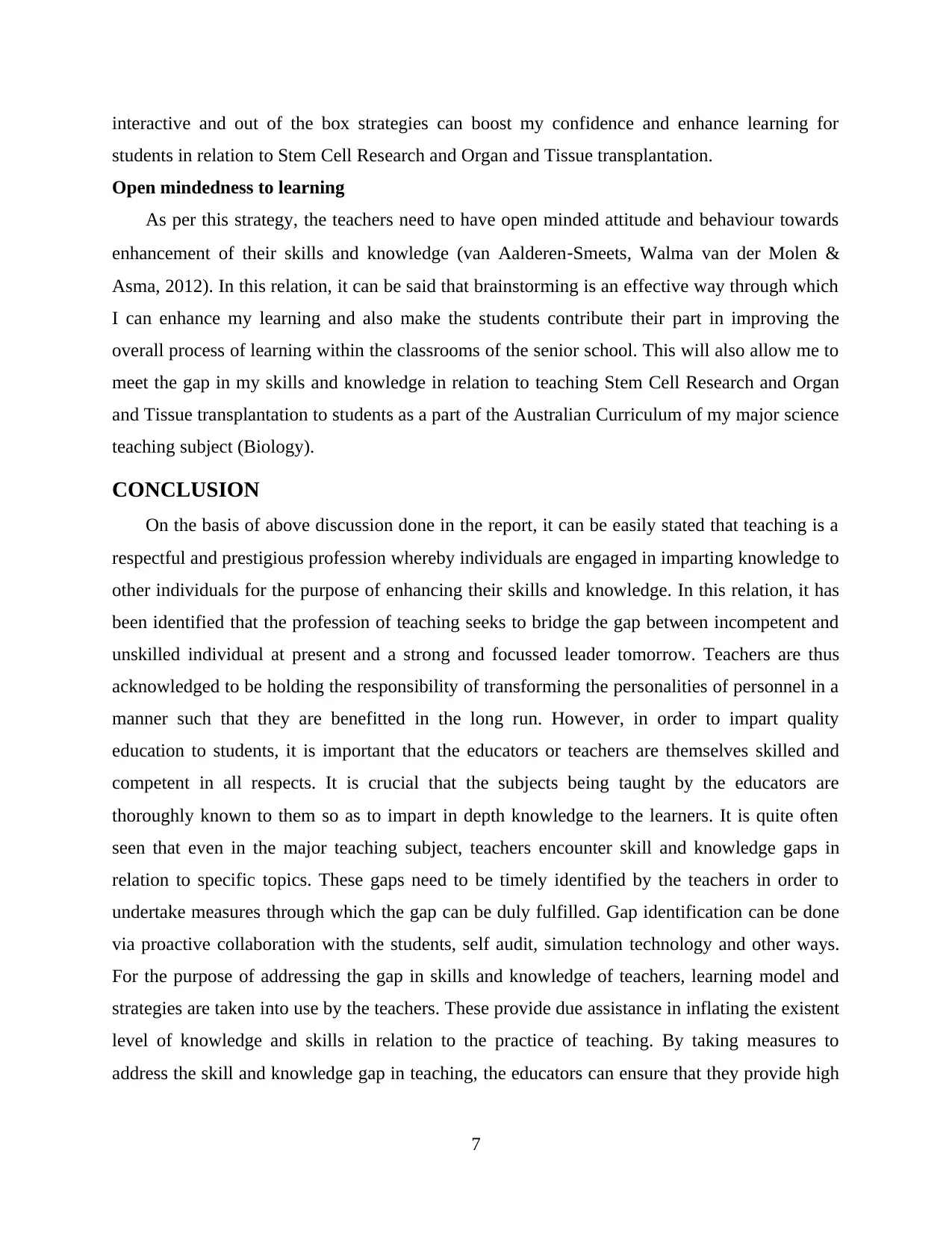
interactive and out of the box strategies can boost my confidence and enhance learning for
students in relation to Stem Cell Research and Organ and Tissue transplantation.
Open mindedness to learning
As per this strategy, the teachers need to have open minded attitude and behaviour towards
enhancement of their skills and knowledge (van Aalderen‐Smeets, Walma van der Molen &
Asma, 2012). In this relation, it can be said that brainstorming is an effective way through which
I can enhance my learning and also make the students contribute their part in improving the
overall process of learning within the classrooms of the senior school. This will also allow me to
meet the gap in my skills and knowledge in relation to teaching Stem Cell Research and Organ
and Tissue transplantation to students as a part of the Australian Curriculum of my major science
teaching subject (Biology).
CONCLUSION
On the basis of above discussion done in the report, it can be easily stated that teaching is a
respectful and prestigious profession whereby individuals are engaged in imparting knowledge to
other individuals for the purpose of enhancing their skills and knowledge. In this relation, it has
been identified that the profession of teaching seeks to bridge the gap between incompetent and
unskilled individual at present and a strong and focussed leader tomorrow. Teachers are thus
acknowledged to be holding the responsibility of transforming the personalities of personnel in a
manner such that they are benefitted in the long run. However, in order to impart quality
education to students, it is important that the educators or teachers are themselves skilled and
competent in all respects. It is crucial that the subjects being taught by the educators are
thoroughly known to them so as to impart in depth knowledge to the learners. It is quite often
seen that even in the major teaching subject, teachers encounter skill and knowledge gaps in
relation to specific topics. These gaps need to be timely identified by the teachers in order to
undertake measures through which the gap can be duly fulfilled. Gap identification can be done
via proactive collaboration with the students, self audit, simulation technology and other ways.
For the purpose of addressing the gap in skills and knowledge of teachers, learning model and
strategies are taken into use by the teachers. These provide due assistance in inflating the existent
level of knowledge and skills in relation to the practice of teaching. By taking measures to
address the skill and knowledge gap in teaching, the educators can ensure that they provide high
7
students in relation to Stem Cell Research and Organ and Tissue transplantation.
Open mindedness to learning
As per this strategy, the teachers need to have open minded attitude and behaviour towards
enhancement of their skills and knowledge (van Aalderen‐Smeets, Walma van der Molen &
Asma, 2012). In this relation, it can be said that brainstorming is an effective way through which
I can enhance my learning and also make the students contribute their part in improving the
overall process of learning within the classrooms of the senior school. This will also allow me to
meet the gap in my skills and knowledge in relation to teaching Stem Cell Research and Organ
and Tissue transplantation to students as a part of the Australian Curriculum of my major science
teaching subject (Biology).
CONCLUSION
On the basis of above discussion done in the report, it can be easily stated that teaching is a
respectful and prestigious profession whereby individuals are engaged in imparting knowledge to
other individuals for the purpose of enhancing their skills and knowledge. In this relation, it has
been identified that the profession of teaching seeks to bridge the gap between incompetent and
unskilled individual at present and a strong and focussed leader tomorrow. Teachers are thus
acknowledged to be holding the responsibility of transforming the personalities of personnel in a
manner such that they are benefitted in the long run. However, in order to impart quality
education to students, it is important that the educators or teachers are themselves skilled and
competent in all respects. It is crucial that the subjects being taught by the educators are
thoroughly known to them so as to impart in depth knowledge to the learners. It is quite often
seen that even in the major teaching subject, teachers encounter skill and knowledge gaps in
relation to specific topics. These gaps need to be timely identified by the teachers in order to
undertake measures through which the gap can be duly fulfilled. Gap identification can be done
via proactive collaboration with the students, self audit, simulation technology and other ways.
For the purpose of addressing the gap in skills and knowledge of teachers, learning model and
strategies are taken into use by the teachers. These provide due assistance in inflating the existent
level of knowledge and skills in relation to the practice of teaching. By taking measures to
address the skill and knowledge gap in teaching, the educators can ensure that they provide high
7
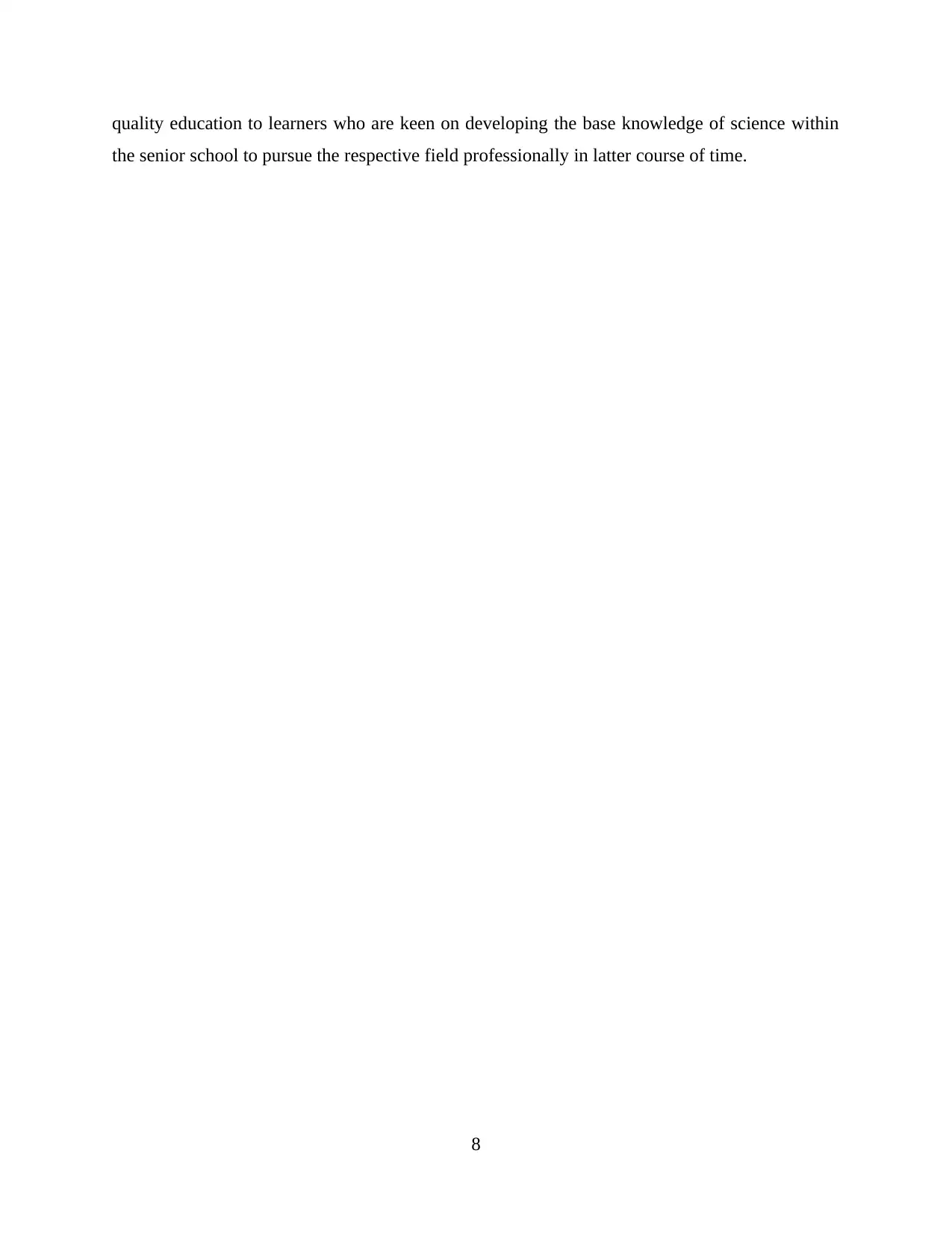
quality education to learners who are keen on developing the base knowledge of science within
the senior school to pursue the respective field professionally in latter course of time.
8
the senior school to pursue the respective field professionally in latter course of time.
8
Secure Best Marks with AI Grader
Need help grading? Try our AI Grader for instant feedback on your assignments.
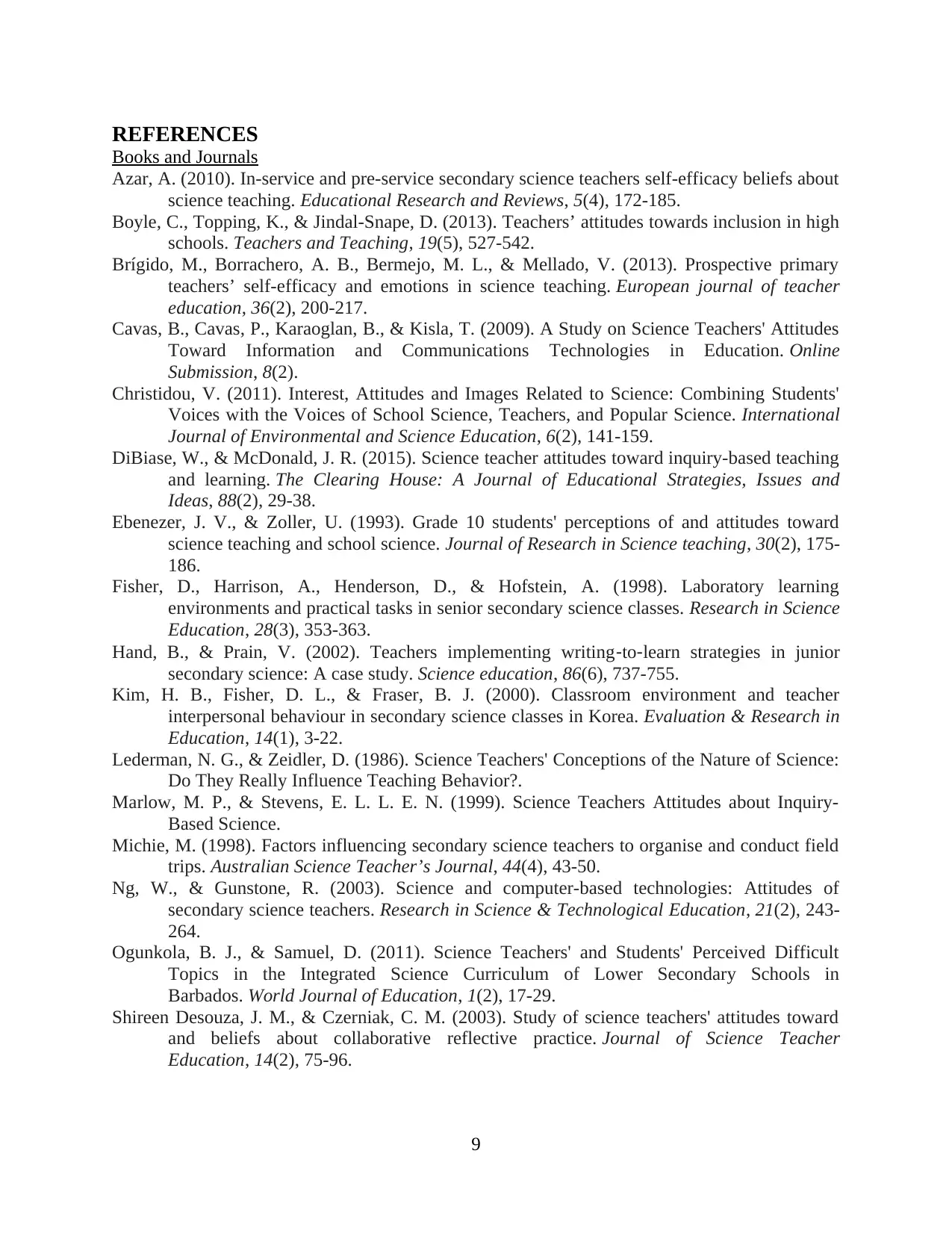
REFERENCES
Books and Journals
Azar, A. (2010). In-service and pre-service secondary science teachers self-efficacy beliefs about
science teaching. Educational Research and Reviews, 5(4), 172-185.
Boyle, C., Topping, K., & Jindal-Snape, D. (2013). Teachers’ attitudes towards inclusion in high
schools. Teachers and Teaching, 19(5), 527-542.
Brígido, M., Borrachero, A. B., Bermejo, M. L., & Mellado, V. (2013). Prospective primary
teachers’ self-efficacy and emotions in science teaching. European journal of teacher
education, 36(2), 200-217.
Cavas, B., Cavas, P., Karaoglan, B., & Kisla, T. (2009). A Study on Science Teachers' Attitudes
Toward Information and Communications Technologies in Education. Online
Submission, 8(2).
Christidou, V. (2011). Interest, Attitudes and Images Related to Science: Combining Students'
Voices with the Voices of School Science, Teachers, and Popular Science. International
Journal of Environmental and Science Education, 6(2), 141-159.
DiBiase, W., & McDonald, J. R. (2015). Science teacher attitudes toward inquiry-based teaching
and learning. The Clearing House: A Journal of Educational Strategies, Issues and
Ideas, 88(2), 29-38.
Ebenezer, J. V., & Zoller, U. (1993). Grade 10 students' perceptions of and attitudes toward
science teaching and school science. Journal of Research in Science teaching, 30(2), 175-
186.
Fisher, D., Harrison, A., Henderson, D., & Hofstein, A. (1998). Laboratory learning
environments and practical tasks in senior secondary science classes. Research in Science
Education, 28(3), 353-363.
Hand, B., & Prain, V. (2002). Teachers implementing writing‐to‐learn strategies in junior
secondary science: A case study. Science education, 86(6), 737-755.
Kim, H. B., Fisher, D. L., & Fraser, B. J. (2000). Classroom environment and teacher
interpersonal behaviour in secondary science classes in Korea. Evaluation & Research in
Education, 14(1), 3-22.
Lederman, N. G., & Zeidler, D. (1986). Science Teachers' Conceptions of the Nature of Science:
Do They Really Influence Teaching Behavior?.
Marlow, M. P., & Stevens, E. L. L. E. N. (1999). Science Teachers Attitudes about Inquiry-
Based Science.
Michie, M. (1998). Factors influencing secondary science teachers to organise and conduct field
trips. Australian Science Teacher’s Journal, 44(4), 43-50.
Ng, W., & Gunstone, R. (2003). Science and computer-based technologies: Attitudes of
secondary science teachers. Research in Science & Technological Education, 21(2), 243-
264.
Ogunkola, B. J., & Samuel, D. (2011). Science Teachers' and Students' Perceived Difficult
Topics in the Integrated Science Curriculum of Lower Secondary Schools in
Barbados. World Journal of Education, 1(2), 17-29.
Shireen Desouza, J. M., & Czerniak, C. M. (2003). Study of science teachers' attitudes toward
and beliefs about collaborative reflective practice. Journal of Science Teacher
Education, 14(2), 75-96.
9
Books and Journals
Azar, A. (2010). In-service and pre-service secondary science teachers self-efficacy beliefs about
science teaching. Educational Research and Reviews, 5(4), 172-185.
Boyle, C., Topping, K., & Jindal-Snape, D. (2013). Teachers’ attitudes towards inclusion in high
schools. Teachers and Teaching, 19(5), 527-542.
Brígido, M., Borrachero, A. B., Bermejo, M. L., & Mellado, V. (2013). Prospective primary
teachers’ self-efficacy and emotions in science teaching. European journal of teacher
education, 36(2), 200-217.
Cavas, B., Cavas, P., Karaoglan, B., & Kisla, T. (2009). A Study on Science Teachers' Attitudes
Toward Information and Communications Technologies in Education. Online
Submission, 8(2).
Christidou, V. (2011). Interest, Attitudes and Images Related to Science: Combining Students'
Voices with the Voices of School Science, Teachers, and Popular Science. International
Journal of Environmental and Science Education, 6(2), 141-159.
DiBiase, W., & McDonald, J. R. (2015). Science teacher attitudes toward inquiry-based teaching
and learning. The Clearing House: A Journal of Educational Strategies, Issues and
Ideas, 88(2), 29-38.
Ebenezer, J. V., & Zoller, U. (1993). Grade 10 students' perceptions of and attitudes toward
science teaching and school science. Journal of Research in Science teaching, 30(2), 175-
186.
Fisher, D., Harrison, A., Henderson, D., & Hofstein, A. (1998). Laboratory learning
environments and practical tasks in senior secondary science classes. Research in Science
Education, 28(3), 353-363.
Hand, B., & Prain, V. (2002). Teachers implementing writing‐to‐learn strategies in junior
secondary science: A case study. Science education, 86(6), 737-755.
Kim, H. B., Fisher, D. L., & Fraser, B. J. (2000). Classroom environment and teacher
interpersonal behaviour in secondary science classes in Korea. Evaluation & Research in
Education, 14(1), 3-22.
Lederman, N. G., & Zeidler, D. (1986). Science Teachers' Conceptions of the Nature of Science:
Do They Really Influence Teaching Behavior?.
Marlow, M. P., & Stevens, E. L. L. E. N. (1999). Science Teachers Attitudes about Inquiry-
Based Science.
Michie, M. (1998). Factors influencing secondary science teachers to organise and conduct field
trips. Australian Science Teacher’s Journal, 44(4), 43-50.
Ng, W., & Gunstone, R. (2003). Science and computer-based technologies: Attitudes of
secondary science teachers. Research in Science & Technological Education, 21(2), 243-
264.
Ogunkola, B. J., & Samuel, D. (2011). Science Teachers' and Students' Perceived Difficult
Topics in the Integrated Science Curriculum of Lower Secondary Schools in
Barbados. World Journal of Education, 1(2), 17-29.
Shireen Desouza, J. M., & Czerniak, C. M. (2003). Study of science teachers' attitudes toward
and beliefs about collaborative reflective practice. Journal of Science Teacher
Education, 14(2), 75-96.
9
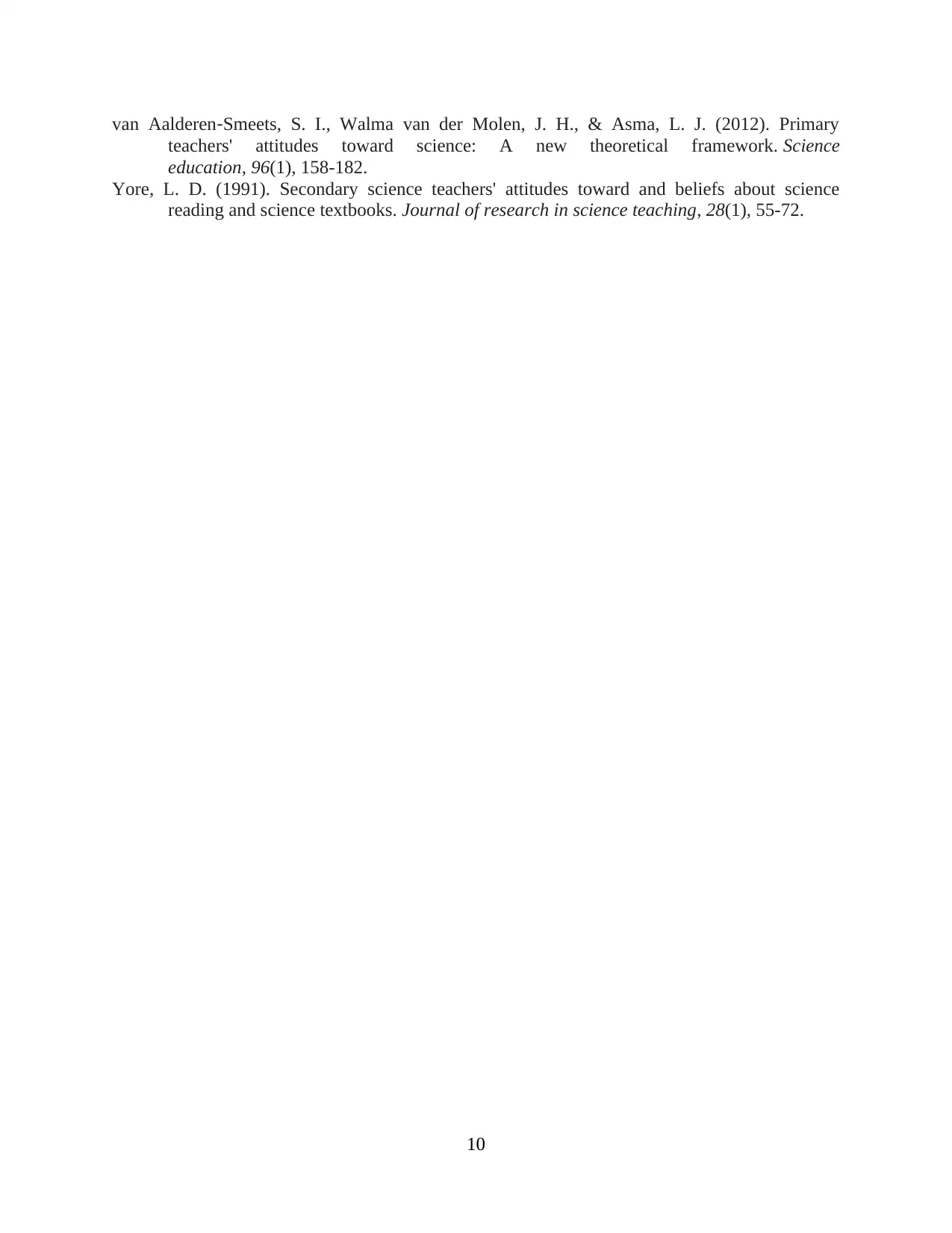
van Aalderen‐Smeets, S. I., Walma van der Molen, J. H., & Asma, L. J. (2012). Primary
teachers' attitudes toward science: A new theoretical framework. Science
education, 96(1), 158-182.
Yore, L. D. (1991). Secondary science teachers' attitudes toward and beliefs about science
reading and science textbooks. Journal of research in science teaching, 28(1), 55-72.
10
teachers' attitudes toward science: A new theoretical framework. Science
education, 96(1), 158-182.
Yore, L. D. (1991). Secondary science teachers' attitudes toward and beliefs about science
reading and science textbooks. Journal of research in science teaching, 28(1), 55-72.
10
1 out of 12
Related Documents
Your All-in-One AI-Powered Toolkit for Academic Success.
+13062052269
info@desklib.com
Available 24*7 on WhatsApp / Email
![[object Object]](/_next/static/media/star-bottom.7253800d.svg)
Unlock your academic potential
© 2024 | Zucol Services PVT LTD | All rights reserved.





